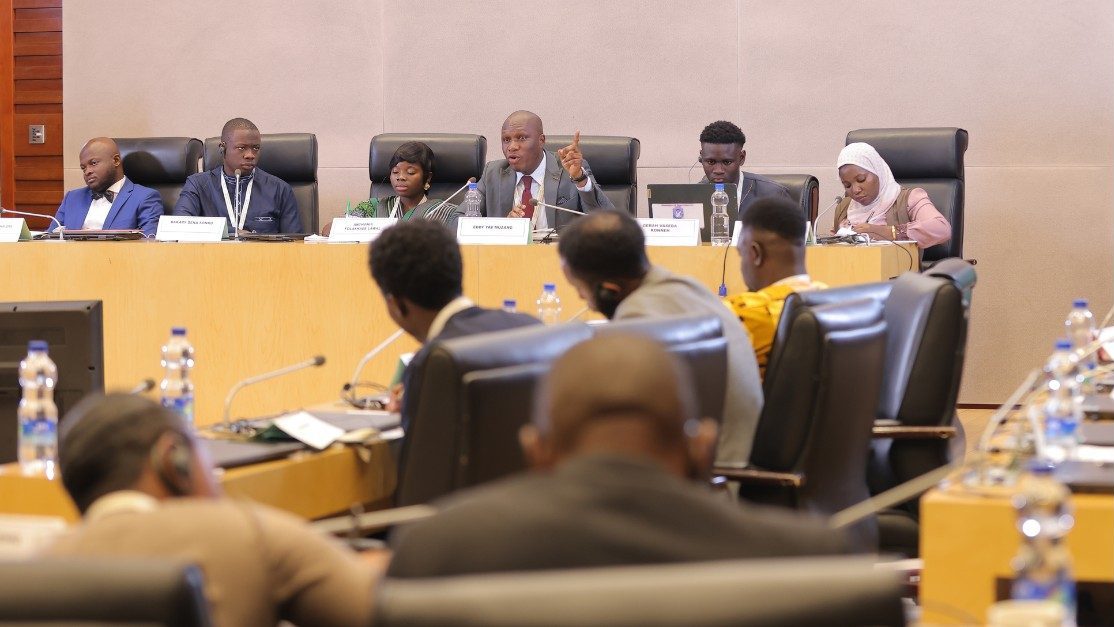The Democratic Republic of the Congo (DRC) is among the African countries most committed to advancing the implementation of United Nations Security Council Resolution (UNSCR) 2250, a foundational text that, for the first time, established the strategic role of youth in conflict prevention, peacebuilding, and post-conflict reconstruction. The adoption of the DRC’s National Action Plan (NAP) 2250 represents a major step forward in integrating youth as essential partners for national stability. In a context where security dynamics remain complex, particularly in the east of the country, the implementation of this plan presents a crucial opportunity to permanently place Congolese youth at the heart of the Youth, Peace, and Security (YPS) Agenda.
The adoption of the DRC’s National Action Plan (NAP) 2250 represents a major step forward in integrating youth as essential partners for national stability.
Tweet
The strategic importance of the NAP 2250 can be explained by several factors. First, the DRC has a large youth population, over 65% of the population is under 25, making this demographic a crucial lever for social transformation and violence prevention. Second, UNSCR 2250, supplemented by UNSCRs 2419 and 2535, provides a robust normative framework to guide states in integrating young people into peace governance. For the DRC, the adoption of these instruments has enabled the development of a national response structured around the resolution’s five pillars: participation, protection, prevention, partnerships, and disengagement/reintegration.
Since its launch, the DRC’s NAP 2250 has yielded tangible progress. At the institutional level, national and provincial consultations were held to gather young people’s priorities, which subsequently informed government strategies. These consultations strengthened the participation of youth organisations in monitoring and dialogue mechanisms, contributing to a more inclusive approach to peace governance. At the community level, several initiatives were undertaken to reduce the risks of radicalisation, promote social cohesion, and strengthen young people’s resilience to the dynamics of violence. Programmes focused on peace education, youth entrepreneurship, and intergenerational dialogue were implemented, often with the support of international partners. Also noteworthy is the establishment of the National Technical Secretariat 2250, the National Committee, and the efforts of the Panel of Experts on Resolution 2250, a youth-led organisation that plays a key role in the implementation of the Youth, Peace and Security agenda in the DRC.
Furthermore, the NAP 2250 programme has played a crucial role in supporting the disengagement and reintegration processes of young people associated with armed groups. Through the Disarmament, Demobilisation, Community Reintegration and Stabilisation Programme (P-DDRCS), the actions undertaken combine psychosocial support, community integration, vocational training, and stigma reduction. These efforts, while significant, remain heavily dependent on available funding, making increased support from technical and financial partners essential to ensure the sustainability of the interventions.
Despite these advances, challenges remain. Funding remains a major obstacle to the full implementation of the NAP. The size of the Congolese territory, the ongoing armed tensions, and the lack of consolidated data also complicate the planning, monitoring, and evaluation of actions. Institutional constraints, including weak coordination between ministries, further hinder the harmonised implementation of the plan. However, these limitations do not diminish the transformative potential of the NAP 2250, especially when supported by strong partnerships and a robust political will.
In this context, the role of regional and international networks is crucial. While not the focus of this article, the International Francophone Youth Network (RIJF) is nonetheless a key player in promoting the YPS Agenda. The RIJF supports the mobilisation of young Francophones, facilitates the exchange of experiences, and strengthens the capacities of youth organisations. In the DRC, its contribution has been particularly evident through advocacy, training, and civic engagement initiatives, which effectively complement national efforts. This synergy between local actors and transnational networks strengthens the reach of the 2250 Agenda and enhances its visibility within the Francophone world.
To accelerate the implementation of the NAP and increase its impact, several courses of action should be considered. It would be necessary to further integrate the NAP into sectoral public policies, education, security, development, and youth, in order to ensure stronger institutional coherence. Increasing national and international resources dedicated to the YPS Agenda will also allow for the expansion of interventions, particularly in areas most affected by conflict. Furthermore, the creation of permanent platforms for dialogue between young people, authorities, and partners is essential to strengthening public accountability and improving citizen engagement.
Another strategic challenge is the need to further promote innovative initiatives led by young Congolese people. Their creativity, resilience, and leadership constitute powerful tools for transforming their communities. Whether in community mediation, social entrepreneurship, civic education, or violence prevention, young people in the DRC are leading innovative experiences that deserve greater recognition and systematic support. Encouraging these initiatives would not only enhance the impact of the NAP 2250 but would also strengthen the DRC’s image as a driving force behind the YPS Agenda in the Francophone and African world.
In conclusion, the implementation of the NAP 2250 in the DRC represents a strategic step forward in building lasting and inclusive peace. Despite the challenges, the progress achieved demonstrates a strong national will and a growing commitment from young Congolese people to peacebuilding. For this momentum to continue and intensify, increased support from national, regional, and international partners is essential. The NAP is not merely a political framework; it is a historic opportunity to transform Congolese youth into key players in stability and development. By strengthening coordination, funding, and partnerships, the DRC can become an inspiring example of the successful implementation of the YPS Agenda.
The NAP is not merely a political framework; it is a historic opportunity to transform Congolese youth into key players in stability and development
Tweet
Moïse Balagizi Musaadan – Expert in Peace, Security, Governance and Multilateral Diplomacy, Youth Ambassador Member, African Union ECOSOCC – Peace & Security Cluster Thematic Coordinator for Democracy, Peace and Security, Réseau International de la Jeunesse de la Francophonie (RIJF) / Organisation Internationale de la Francophonie (OIF) Jurist, Researcher in International Law and Human Rights Specialist


